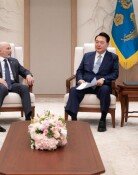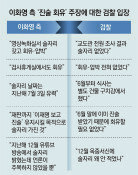Seoul must confidently clarify stance over THAAD
Seoul must confidently clarify stance over THAAD
Posted May. 20, 2015 09:16,
The issue over the deployment in South Korea of Terminal High Altitude Area Defense (THAAD) has entered a new phase due to U.S. Secretary of State John Kerrys statement. Kerry seemed to have strategic intention when he mentioned North Koreas nuclear weapons development and other matters at the U.S. Forces Koreas Yongsan base in Seoul, saying, This is the reason we talk about the THAAD system and other matters, before leaving South Korea on Monday afternoon. Under this circumstance, the South Korean public feel heavy about the South Korean government that continuously repeats "3 Nos," saying that there were no request, discussions and decision over the deployment of THAAD.
After the North succeeded in shooting test of submarine-launched ballistic missile (SLBM), the South Korean defense ministry predicted the North will deploy the new weapons within four to five years for combat. North Korean nuclear development is very serious, as evidenced by Chinese experts who estimate that Pyongyang currently has 20 nuclear warheads. The Norths continuous test firing of ballistic missiles is also threatening. Amid this development, it would be more appropriate for South Korea to move faster than the U.S., which is considering the deployment of THAAD to ensure protection of the U.S. troops stationed in Korea. The Korean Air Missile Defense (KAMD) and the Kill Chain, which are designed for defending the South against the Norths nuclear warheads, will only be constructed in the mid-2020s. Worse still, South Korea has now loopholes in deterrence of SLBM. If THAAD is the best strategy, it should boldly clarify this, and speed up discussions with the U.S. over its deployment.
The Asia Security Council Meeting (Shangri-La Dialogue) will take place in Singapore from May 27. South Korean Defense Minister Han Min-koo will attend the meeting and meet with his U.S. counterpart Ashton Carter. The U.S. could also raise issues with THAAD during the South Korea-U.S. summit next month. With the Norths threat getting increasingly serious, if Seoul and Washington fail to discuss specific measures including the deployment of THAAD, the term "strong alliance" will prove to be merely a blank rhetoric.
The THAAD has been in public debate since last year. If South Korea turns a deaf ear when Washington repeatedly sends signals, it could become a negative factor in the Seoul-Washington ties. President Park Geun-hye appointed former chief of the National Security Office Kim Jang-soo as the South Korean Ambassador to China in expectation for Seoul-Beijing security cooperation. The only visible and notable action taken by Ambassador Kim was his statement in a recent interview with Phoenix TV in Hong Kong suggesting that THAAD is not an issue China needs to be concerned about. At around this juncture, the South Korean government should dump its strategic ambiguity and decisively and boldly clarify to Beijing that Seoul is considering the deployment of THAAD from the perspective of self-defense as a sovereign nation, and end controversy over the issue.
Japanese Defense Minister Gen Nakatani said, If North Korea prepares additional launch of missiles after striking the U.S., Japan could strike North Korean military bases in the East Sea by mobilizing our collective self-defense right, thus suggesting "preemptive strike of enemy bases." Under this circumstance, what the South Korean government should do is to put in place the highest level of preparedness to counter the Norths threat.







